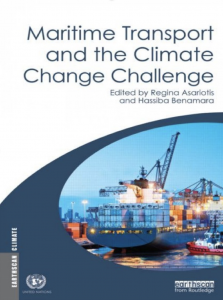UNCTAD has been working, ‘ahead of the curve’, on the implications of climate change for maritime transportation, since 2008, with particular emphasis on impacts and adaptation needs of seaports and other coastal transport infrastructure.
Relevant work contributes directly to implementation of a number of Sustainable Development Goals and targets, as well as to implementation of the Addis Ababa Action Agenda for Financing for Development, the SAMOA Pathway, and the Paris Agreement; and benefits from strong support of Member States.
UNCTAD’s work has been cited in the 5th Assessment Report of the IPCC WG II Report (2014), as well as in the Climate Change Policy Framework for Jamaica (2015) and the National Adaptation Plan to Climate Change for Brazil (Vol.2) (2016).
Academic publications include an UNCTAD edited book on “Maritime Transport and the Climate Change challenge“, co-published by the UN and Earthscan (Asariotis and Benamara, 2012) and providing detailed insight on a range of the potential implications of climate change for this key sector of global trade; as well as a multidisciplinary academic paper (Becker et. al.,”A Note on Climate change adaptation for seaports: A challenge for global ports, a challenge for global society”. Climatic Change (2013), co-authored by experts following an UNCTAD Expert Meeting.
Other relevant initiatives by the UNCTAD secretariat include a number of intergovernmental expert meetings which have focused on the implications of climate change for maritime transport, highlighting in particular the need to adapt to the impacts of climate change.
They include an Ad-Hoc Expert Meeting on “Climate Change Impacts and Adaptation: A Challenge for Global Ports“, held in September 2011 and a Joint UNECE-UNCTAD Workshop on “Climate Change Impacts on International Transport Networks“, held in September 2010 – leading to the establishment of a UNECE Expert Group on the subject – and a Multi-year Expert Meeting on Transport and Trade Facilitation with a focus on “Maritime Transport and the Climate Change Challenge“, held in February 2009.
The implications of climate change for coastal transport systems were also considered at two Expert Meetings with a focus on the transport-related challenges facing Small Island Developing States (SIDS), namely the third session of the Multi-year Expert Meeting on Transport, Trade Logistics and Trade Facilitation, “Small Island Developing States: Transport and Trade Logistics Challenges“, held on 24-26 November 2014, and the Ad Hoc Expert Meeting on “Addressing the Transport and Trade Logistics Challenges of the Small Island Developing States (SIDS): Samoa Conference and Beyond“, held on 11 July 2014.
Throughout the implementation of the project, central project findings and substantive issues arising have been presented at a number of international conferences and meetings. Some illustrative examples are mentioned below.
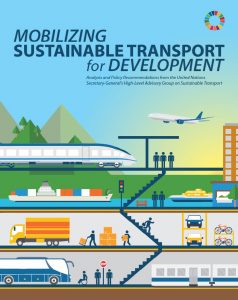 UNCTAD contributes actively to relevant inter-agency work under the auspices of UN-OCEANS, and the Technical Working Group to support the UN Secretary-General’s High Level Advisory Group on Sustainable Transport, among others. To this end, UNCTAD has contributed to several technical documents prepared by the TWG, as well as to the final report of the Secretary-General’s High-Level Advisory Group on Sustainable Transport, Mobilizing Sustainable Transport for Development. The present DA project was selected as a case-study for inclusion in the report.
UNCTAD contributes actively to relevant inter-agency work under the auspices of UN-OCEANS, and the Technical Working Group to support the UN Secretary-General’s High Level Advisory Group on Sustainable Transport, among others. To this end, UNCTAD has contributed to several technical documents prepared by the TWG, as well as to the final report of the Secretary-General’s High-Level Advisory Group on Sustainable Transport, Mobilizing Sustainable Transport for Development. The present DA project was selected as a case-study for inclusion in the report.
As part of its contribution to the first UN Global Sustainable Transport Conference, held in Ashgabat, Turkmenistan on 26-27 November 2016, UNCTAD co-led and participated in a high-level thematic panel on “Sustainable Transport Solutions to the Climate Crisis”, highlighting key challenges in respect of climate change adaptation and resilience building for transport infrastructure. The importance of effective climate change adaptation and DRR for critical coastal transport infrastructure, in particular in SIDS, as well as the related urgent need for capacity-building and financing is also reflected in the relevant outcome document, the ‘Ashgabat Statement on Commitments and Policy Recommendations’.
In October 2017, UNCTAD participated in the ICAO-UN Workshop on Aviation Partnerships for Sustainable Development held as part of the 2017 Global Sustainable Aviation Summit, highlighting the case for action in respect of climate change impacts and adaptation for coastal transport infrastructure in SIDS.
As part of its collaboration with intergovernmental and non-governmental organizations, UNCTAD participates in a Working Group on climate change adaptation for maritime and inland port and navigation infrastructure, which was established in 2015 by PIANC, the key NGO representing global waterborne transport infrastructure, to prepare some industry guidelines for adaptation planning. UNCTAD has also participated in the development of the Regional Framework for Adaptation to Climate Change in coastal and marine areas in the Mediterranean, which was endorsed by the Contracting Parties to the Barcelona Convention for the Protection Of The Mediterranean Sea Against Pollutionin 2016.
 At UNFCCC COP23, UNCTAD participated in the Climate Action Studio, as well as in a panel discussion hosted by Partnership for Action on Green Economy (PAGE) on “How to build green and inclusive economies to implement the Paris Agreement?”
At UNFCCC COP23, UNCTAD participated in the Climate Action Studio, as well as in a panel discussion hosted by Partnership for Action on Green Economy (PAGE) on “How to build green and inclusive economies to implement the Paris Agreement?”
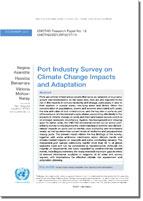
Complementing its technical assistance work, UNCTAD published the findings of a ‘Port industry survey on climate variability and change’, designed in collaboration with global port industry associations and other experts. The survey aimed to improve the understanding of weather and climate-related impacts on ports and to identify data availability and information needs, as well as determine current levels of resilience and preparedness among ports.
Relevant information is urgently required for the purposes of risk-assessment and adaptation planning, including in particular for ports in developing regions. Results of the port industry survey provide important contextual information, particularly as the respondent port sample (collectively handling 16% of global seaborne trade) can be considered as representative. Although the majority of respondents had been impacted by weather/climate related events, including by extremes, the study revealed important gaps in terms of relevant information available to seaports of all sizes and across regions, with implications for effective climate risk assessment and adaptation planning.
Climate-related extreme events could have significant implications for seaport infrastructure, operations and services, with important repercussions for global sustainable development prospects and particularly for SIDS and other vulnerable groups of countries. Several extreme weather events of summer 2018 have prompted an UNCTAD article on how 2018 demonstrates extreme weather’s impact on development, including trade related implications of weather extremes, highlighting some relevant recent research.
 The World Bank estimates that, globally, disasters caused by natural hazards cost an annual $520 billion in consumption loss – human and economic losses. The important need to reduce economic losses from disasters was the focus of an interactive discussion organized by UNCTAD, UNISDR and ITC on the occasion of the International Day for Disaster Reduction 2018. The event, which took place in Geneva and was live-streamed, spotlighted ongoing efforts to integrate disaster and climate risks into development, trade and financial systems. Presentations, including from the OECS Commission, as well as further information and documentation is available on the UNCTAD meetings website.
The World Bank estimates that, globally, disasters caused by natural hazards cost an annual $520 billion in consumption loss – human and economic losses. The important need to reduce economic losses from disasters was the focus of an interactive discussion organized by UNCTAD, UNISDR and ITC on the occasion of the International Day for Disaster Reduction 2018. The event, which took place in Geneva and was live-streamed, spotlighted ongoing efforts to integrate disaster and climate risks into development, trade and financial systems. Presentations, including from the OECS Commission, as well as further information and documentation is available on the UNCTAD meetings website.
 As part of its active participation at the UNFCCC process, UNCTAD co-organized and contributed to side events on sustainable transport, international shipping, climate resilience and sustainability, and ocean-related issues, at the twenty-fourth session of the Conference of the Parties to the United Nations Framework Convention on Climate Change (COP 24), in Katowice, Poland. These included a joint side event with a focus on climate change mitigation and adaptation for maritime transport, in collaboration with IMO; contribution to the COP 24 Transport Day; as well as to side events on optimizing the integration of ocean-related issues in NDCs and National Adaptation Plans for the achievement of SDG 14, in collaboration with UN-OCEANS; on mitigation and resilience action plans for ports, in collaboration with Global Climate Action; and on climate change and protecting the rights of the most vulnerable, in collaboration with OHCHR.
As part of its active participation at the UNFCCC process, UNCTAD co-organized and contributed to side events on sustainable transport, international shipping, climate resilience and sustainability, and ocean-related issues, at the twenty-fourth session of the Conference of the Parties to the United Nations Framework Convention on Climate Change (COP 24), in Katowice, Poland. These included a joint side event with a focus on climate change mitigation and adaptation for maritime transport, in collaboration with IMO; contribution to the COP 24 Transport Day; as well as to side events on optimizing the integration of ocean-related issues in NDCs and National Adaptation Plans for the achievement of SDG 14, in collaboration with UN-OCEANS; on mitigation and resilience action plans for ports, in collaboration with Global Climate Action; and on climate change and protecting the rights of the most vulnerable, in collaboration with OHCHR.
 Some of the main substantive findings and technical details of the methodology developed under the project on Climate change impacts on coastal transport infrastructure in the Caribbean: enhancing the adaptive capacity of Small Island Developing States were presented and discussed in a scientific paper (Monioudi et.al, Reg Environ Change, 2018) and informed the IPCC 2018 report on 1.5 degrees “Impacts of 1.5 ºC global warming on natural and human systems”, as well as the IPCC 2019 Special Report on Ocean and Cryosphere, highlighting substantial increases in risk to critical coastal transportation infrastructure in Saint Lucia and Jamaica from climate changed-induced marine inundation as early as in the 2030s, unless further climate change adaptation is undertaken. Related project findings were also published in the World Economic Situation and Prospects reports of 2019 and 2020.
Some of the main substantive findings and technical details of the methodology developed under the project on Climate change impacts on coastal transport infrastructure in the Caribbean: enhancing the adaptive capacity of Small Island Developing States were presented and discussed in a scientific paper (Monioudi et.al, Reg Environ Change, 2018) and informed the IPCC 2018 report on 1.5 degrees “Impacts of 1.5 ºC global warming on natural and human systems”, as well as the IPCC 2019 Special Report on Ocean and Cryosphere, highlighting substantial increases in risk to critical coastal transportation infrastructure in Saint Lucia and Jamaica from climate changed-induced marine inundation as early as in the 2030s, unless further climate change adaptation is undertaken. Related project findings were also published in the World Economic Situation and Prospects reports of 2019 and 2020.
UNCTAD held an ad hoc Expert Meeting entitled “Climate Change Adaptation for International Transport: Preparing for the Future” (Geneva, April 2019) bringing together technical experts, key industry stakeholders and some international organizations. The meeting aimed to identify effective ways to support climate change adaptation action, resilience and capacity building, across closely interlinked transport modes and global supply chains, and to develop some policy recommendations to help inform the UN Climate Summit in September 2019. It also aimed to contribute towards progress in advancing the 2030 Sustainable Development Agenda and explore options for an informal international transport adaptation forum.
As part of its collaboration with related industry and UN initiatives, UNCTAD participated in the development of a global port industry guidance on climate change adaptation planning with PIANC and contributed to a report on Climate Change Impacts and Adaptation for International Transport Networks (2020) of the UNECE Group of Experts on Climate Change Adaptation for International Transport Network and Nodes.
 UNCTAD continues to actively contribute to the UNFCCC process including through, inter alia, contributions to the GCA Transport and Resilience Pathway documents (Resilience pathway action table; Transport pathway action table), prepared by the Marrakech Partnership for Global Climate Action, and launched at the twenty-fifth Conference of the Parties to the United Nations Framework Convention on Climate Change in December 2019 (COP25, Madrid); a UNFCCC WIM Excom-TEC Policy brief on technologies for averting, minimizing and addressing loss and damage in coastal zones; as well as numerous efforts on Seizing the opportunity of the climate action momentum to promote sustainability, adapt and build resilience against the climate emergency at COP 25.
UNCTAD continues to actively contribute to the UNFCCC process including through, inter alia, contributions to the GCA Transport and Resilience Pathway documents (Resilience pathway action table; Transport pathway action table), prepared by the Marrakech Partnership for Global Climate Action, and launched at the twenty-fifth Conference of the Parties to the United Nations Framework Convention on Climate Change in December 2019 (COP25, Madrid); a UNFCCC WIM Excom-TEC Policy brief on technologies for averting, minimizing and addressing loss and damage in coastal zones; as well as numerous efforts on Seizing the opportunity of the climate action momentum to promote sustainability, adapt and build resilience against the climate emergency at COP 25.
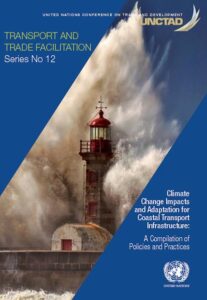 In 2020, UNCTAD published a report entitled ‘Climate Change Impacts and Adaptation for Coastal Transport Infrastructure: A Compilation of Policies and Practices’ to contribute to bridging an important knowledge gap with regards to climate change impacts and adaptation for coastal transport infrastructure. The compilation presents examples of legal, regulatory and policy approaches, as well as of reports, studies and guidance to support climate risk, vulnerability and impact assessment, and the development of effective adaptation response measures. The compilation provides an overview of each example listed and refers to the original source documents as well as other related material providing further information. Practices addressed in the document relate to a total of over 35 countries covering five continents, as well as practices that are considered of global nature. The included material has been selected and presented with a view to informing, guiding and inspiring policy makers, national authorities, transport infrastructure planners and managers, and other interested stakeholders in their efforts to advance climate change adaptation for coastal transport infrastructure and increase levels of preparedness.
In 2020, UNCTAD published a report entitled ‘Climate Change Impacts and Adaptation for Coastal Transport Infrastructure: A Compilation of Policies and Practices’ to contribute to bridging an important knowledge gap with regards to climate change impacts and adaptation for coastal transport infrastructure. The compilation presents examples of legal, regulatory and policy approaches, as well as of reports, studies and guidance to support climate risk, vulnerability and impact assessment, and the development of effective adaptation response measures. The compilation provides an overview of each example listed and refers to the original source documents as well as other related material providing further information. Practices addressed in the document relate to a total of over 35 countries covering five continents, as well as practices that are considered of global nature. The included material has been selected and presented with a view to informing, guiding and inspiring policy makers, national authorities, transport infrastructure planners and managers, and other interested stakeholders in their efforts to advance climate change adaptation for coastal transport infrastructure and increase levels of preparedness.
 Currently, UNCTAD and UNEP are implementing a project on ‘Climate resilient transport infrastructure for sustainable trade, tourism and development in SIDS’ (2019-2020), funded by Germany, which focuses on the close link between transport, trade, tourism and sustainable development in these vulnerable island states. In this context, a High Level Panel discussion on ”Climate resilient transport infrastructure for sustainable trade, tourism and development in SIDS” was co-organized by UNCTAD and UNEP, with the support of the OECS Commission, Commonwealth Secretariat, UNFCCC and ISO, as a side event of the twenty-fifth session of the Conference of the Parties to the United Nations Framework Convention on Climate Change (COP25, Madrid, 2019). The video of the High Level Panel discussion is available on the UNFCCC website (no sign in required). The discussion was informed by a concept note and led to an outcome document summarising main points emerging from the discussion along with underlying some key considerations for the way forward to enhance the resilience of coastal transport infrastructure for sustainable trade, tourism and development in SIDS. For a related UNEP web-story, see Small Island Developing States: Building resilience for sustainable trade, tourism and development.
Currently, UNCTAD and UNEP are implementing a project on ‘Climate resilient transport infrastructure for sustainable trade, tourism and development in SIDS’ (2019-2020), funded by Germany, which focuses on the close link between transport, trade, tourism and sustainable development in these vulnerable island states. In this context, a High Level Panel discussion on ”Climate resilient transport infrastructure for sustainable trade, tourism and development in SIDS” was co-organized by UNCTAD and UNEP, with the support of the OECS Commission, Commonwealth Secretariat, UNFCCC and ISO, as a side event of the twenty-fifth session of the Conference of the Parties to the United Nations Framework Convention on Climate Change (COP25, Madrid, 2019). The video of the High Level Panel discussion is available on the UNFCCC website (no sign in required). The discussion was informed by a concept note and led to an outcome document summarising main points emerging from the discussion along with underlying some key considerations for the way forward to enhance the resilience of coastal transport infrastructure for sustainable trade, tourism and development in SIDS. For a related UNEP web-story, see Small Island Developing States: Building resilience for sustainable trade, tourism and development.
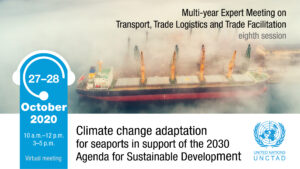 UNCTAD organised a multi-year expert meeting on “Climate change adaptation for seaports in support of the 2030 Agenda for Sustainable Development” on 27-28 October 2020. The fully virtual UNCTAD expert meeting included panel discussions covering a wide range of topics (programme), including the challenges associated with climate change impacts and adaptation for ports, key issues and experiences along with recent developments and national experiences, as well as cross-cutting issues (e.g. energy efficiency and climate change mitigation) with a special session dedicated to the special case of small island developing States and other small island economies. The UNCTAD secretariat presented key messages and recommendations as submitted by the panellists to facilitate the interactive discussion.
UNCTAD organised a multi-year expert meeting on “Climate change adaptation for seaports in support of the 2030 Agenda for Sustainable Development” on 27-28 October 2020. The fully virtual UNCTAD expert meeting included panel discussions covering a wide range of topics (programme), including the challenges associated with climate change impacts and adaptation for ports, key issues and experiences along with recent developments and national experiences, as well as cross-cutting issues (e.g. energy efficiency and climate change mitigation) with a special session dedicated to the special case of small island developing States and other small island economies. The UNCTAD secretariat presented key messages and recommendations as submitted by the panellists to facilitate the interactive discussion.

Read the ‘New York Times’article reporting on the UNCTAD Ad-Hoc Expert Meeting on “Climate Change Impacts and Adaptation: A Challenge for Global Ports” (September 2011)
‘Little Preparation Under Way for Climate Change at World’s Seaports’

Read the article of ‘Le Monde’ reporting on the UNCTAD Multi-year Expert Meeting focusing on “Maritime Transport and the Climate Change Challenge” (February 2009)
‘Le transport maritime explore des pistes pour réduire ses émissions de CO2’
Read the article by the Secretary-General of UNCTAD on UNCTAD and the climate change challenge (International Institute on Sustainable Development, May 2009)
Watch the video of UNCTAD Deputy Secretary-General, Ms Isabelle Durant highlighting the importance of climate change adaptation and disaster risk reduction for transport infrastructure, in particular in SIDS in an interview for the UNFCCC Climate Action Studio at COP 23.
Key Documents to Download
Multi-Year Expert Meeting on Transport and Trade Facilitation: Maritime Transport and the Climate Change Challenge, 16–18 February 2009
Joint UNECE-UNCTAD Workshop: Climate Change Impacts on International Transport Networks, 08 September 2010
Ad Hoc Expert Meeting on Climate change impacts and adaptation: a challenge for global ports, 29 – 30 September 2011
Climate Change Impacts and Adaptation: A Challenge for Global Ports (UNCTAD/DTL/TLB/2011/2)
Ad Hoc Expert Meeting on “Addressing the Transport and Trade Logistics Challenges of the Small Island Developing States (SIDS): Samoa Conference and Beyond”, 11 July 2014
Summary of Discussions and Outcomes (UNCTAD/DTL/TLB/2014/3)
Multi-year Expert Meeting on Transport, Trade Logistics and Trade Facilitation, third session (small island developing States), 24 – 26 November 2014
Ad Hoc Expert Meeting on Climate Change Adaptation for International Transport: Preparing for the Future, 16 – 17 April 2019
Port Industry Survey on Climate Change Impacts and Adaptation (UNCTAD/SER.RP/2017/18/Rev.1)
Climate change adaptation for seaports in support of the 2030 Agenda for Sustainable Development, Note by the UNCTAD secretariat (TD/B/C.I/MEM.7/23)
Report of the Multi-year Expert Meeting on Transport, Trade Logistics and Trade Facilitation on its eighth session (TD/B/C.I/MEM.7/24)
